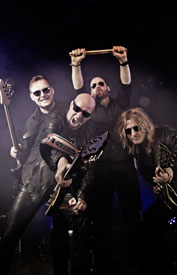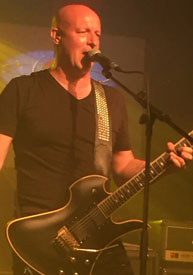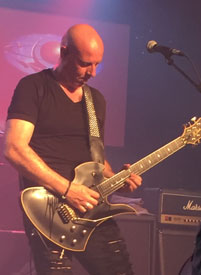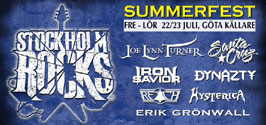|
Interview conducted July 23 2016 Interview published July 29 2016 |
"There's no riff and no melody existing that never have been played before, so it would be a lie to say that I create completely new stuff."
In order to talk about Iron Savior's May 2016 release Titancraft and to have a quick look at some of the decisions made over the years, Metal Covenant recently met up with the band's leader, guitarist and vocalist Piet Sielck before the show at the indoor event "Stockholm Rocks - Summerfest".
![]()
Tobbe: Your new album, Titancraft, has been out for 2 months now and what does it have that your previous albums don't have?
Piet: It definitely has a better sound and production-wise I think it's the best Iron Savior album so far. Actually on the trip to Sweden we were listening to the album again. It's still in my CD-player, which is a good sign, because I've been listening to this album a million times by now probably.
What I really like about this album is, as I said, the production itself, and the mix of, well let's put it like this, some progressive elements and some really straightforward stuff. Speaking of Beyond The Horizon, for the more progressive approach of the album, and Gunsmoke, you know. It's really cool for me that these 2 songs can coexist on the same album and blend together well.
Tobbe: You've pretty much stayed in the same vein with your lyrics over the years, so what are your thoughts when you grab pen and paper and sit down and have lyrical ideas?
Piet: Well, I mean, if I have ideas it's a great feeling to write lyrics. But sometimes I just don't have ideas and that is really a pain in the ass. [Laughs] If you know that the clock is running and delivery date is drawing nearer and nearer and you just don't have any decent ideas it can be really frustrating. But, I mean, so far I have always managed to do it somehow. You know, the dumb thing for me also is that I really take lyrics very, very seriously, because when I sing this stuff I cannot just sing cool-sounding words. I mean, if it's okay for other people, fine, but it isn't working for me.
You know, if I sing something I have to interpret it and if I have to interpret then it somehow has to make sense and has to be cool and there has to be an outline. At least something that I understand when I sing it, otherwise I feel like singing into the nothingness, you know. This results in being able to bring feelings and emotions towards the songs and that's always my main approach to the song.
Tobbe: People nowadays don't tend to read the liner notes as much as they did before, you know, with vinyls. So how much do you think that people actually read your lyrics?
Piet: I'm surprised how many people there are that really read the lyrics. Iron Savior is known to be a band who takes care for lyrics on the very first minute. It's not just like "Blah, blah, blah, heavy metal." and some other cool-sounding words "Thunder, steel, lightning." and everything, you know. It's works too and nothing wrong with that, but people who listen to Iron Savior know that lyrics do matter to us, so that's why they really read the lyrics, more than with other bands.
Tobbe: And you have a story to fall back on as well.
Piet: Yeah, a story line. I still really love the Iron Savior story, but Titancraft, of course, is not a concept album. After doing it 4 times in a row I'm kind of through with concept albums. [Laughs]
 Tobbe:
So besides concept albums, what are you trying to avoid when you write
a song nowadays?
Tobbe:
So besides concept albums, what are you trying to avoid when you write
a song nowadays?
Piet: It's not really that I want to avoid something. Well, I mean, of course I want to avoid to repeat myself and it's of course a big "No" if I get a feeling that I have been doing something before, in a negative way, because then, of course, it ends up in the trash can. Sometimes there's nothing, because I cannot reinvent heavy metal, you know. There's no riff and no melody existing that never have been played before, so it would be a lie to say that I create completely new stuff.
I mean, you don't know, but it's always a matter of how you blend the things together and arrange it in a different way to create something new, because in the end the whole thing is what counts. Of course, sometimes there might be a riff or a melody which sound like something that I did before, but as long as it pleases me and I have a good feeling about it… Because you know that situation where you listen to something and it sounds familiar somehow, and it can sound familiar in a good way or in a stupid way. So if it's the latter, then of course…Trash can… Away! [Laughs]
Tobbe: You know, Iron Savior basically plays speedy music, but still you keep a melodic side to it, so how are you able to merge speed and melody into songs?
Piet: Well, I mean, that is something that I've been doing basically my entire life, you know. I was just giving another interview and somebody asked me what was the song that influenced me the most, if I look at my musical career, and I thought about it and said "Maybe it was Exciter by [Judas] Priest.". Because when I was 13 or 14 years old, Kai [Hansen] and I went to see AC/DC, with Bon Scott at the time, and Priest were supporting them.
In that time we didn't know about Priest and we just went there to see AC/DC, but got of course blown away completely when they played the entire Unleashed In The East set. Of course opening with Exciter. And so, coming back to the song Exciter. I mean, this is what made Kai and I start writing speed metal songs, and there's this nice little melody in Exciter. So this started things up a little bit, you know, to do melodic speed power metal. Of course, at that time this term didn't exist, so.
 Tobbe:
So what's your number one inspiration to keep on making Iron Savior albums?
Tobbe:
So what's your number one inspiration to keep on making Iron Savior albums?
Piet: Well, I think my biggest inspiration is that I just love to do Iron Savior. It gives me so much pleasure, to be honest. To be together with the guys and to play shows and we have such a great band chemistry. We have a friendship going and it's amazing and that definitely is one thing that keeps driving me doing Iron Savior. But also, as long as I have the feeling that as a songwriter I have not said everything that I can say in one life. There's still creative power in me and it would be stupid to just end it, because you're beyond 50. [Laughs]
Tobbe: When you're making the albums, how are you able to involve the other guys? Iron Savior isn't active all the time, so do you record during a long time?
Piet: Yes, we record during a long time and of course I always kick those lazy asses around here so that they contribute a little more to the album. [Guitarist Joachim "Piesel" Küstner and bassist Jan-Sören Eckert are sitting right beside us.] Iron Savior is not a 100 % professional band, you know. Piesel has a job and is on the road continuously with Gamma Ray, Helloween or Edguy, so he's quite often away. Jan also has a fixed job where he has to be. And sometimes time is running really short and we are making a new album and right in the middle of the mix, someone's like "Oh. I have a new song idea." and then "Keep it for the next one!", you know. So, of course I wish that there would be more from these guys.
Tobbe: Iron Savior released its first album in 1997 and has mostly been active in the studio and not touring so much, so why didn't Iron Savior end up being more of a touring band?
Piet: Actually I think there are many reasons to it. The first reason is that I have a family, so it never was my top priority to be on the road 300 days a year. I had children from the first minute on when starting doing Iron Savior, so touring was okay for me, but only moderate touring. Touring also at that time was really expensive.
There was no money coming from touring and it was more or less just a promotional thing. We were supporting Grave Digger and we were supporting Running Wild. We have great memories from that time and of course it was successful for the band, but it was a lot of money and it made a big minus on my bank account. From that on I really took it easy with touring, you know, because it was just too expensive for me. It was eating up too much income.
This was one reason, but that was of course not the main reason, because the main reason basically for a long time was that most of the band members had different obligations and it was really hard to find a day where everybody would be available. And since 2011 we are working with substitutes, so if Piesel is unavailable we use Jan Bertram from Paragon and if Thomas [Nack, drums] is not available we use Sören Teckenburg [from Paragon as well] and since we're doing this we play a lot more shows.
Tobbe: Still, if you want to become a bigger band you've gotta be seen more frequently and play a lot more festivals and stuff.
Piet: That's right. I mean, becoming a real big, big heavy metal act, to be honest, was never our top priority. If it would happen, nobody of us would say no, but the top priority was just to perform, play and create music and somehow make a living out of it. [Laughs]
Tobbe: Since you're not touring so much, how much do you guys rehearse together before your shows?
Piet: Well, I mean, this year actually we do quite a lot of shows. For example, this year we do like 15 shows just in 6 months and if you put all that together it would end up as a decent tour, you know. But since we are homebound, you know, we do have families, we basically do it on the weekends. So it's not a continuous tour and it's spread over several weekends during the year. So that's what we're doing and that's what we also will do in the future. But I think, instead of 15 shows a year we can maybe do at least 25-30 shows a year. But more, no, I don't think so.
Tobbe: You've been working with quite a few bands over the years, as a producer, engineer and stuff, and since most bands are unable to make the big bucks nowadays, do the producers and mixers and all that have to lower their fees as well to adapt to today's standards?
Piet: Sure, sure. You know, going back 20 years, getting a decent recording was only possible in a professional sound studio, with really expensive equipment, with a mixing desk, with MCI 24-track recorders and all these goodies from the old analog days, but since the computer took over more and more, for a couple of hundred Euros everybody can buy a Macintosh, a Logic Pro X or whatever and start recording and if you know what you're doing you can come up with really decent quality that's good enough to make a record from.
But…it's not only that you need to know how to record properly, it's also what you record, you know, and you will always need your ears, because the computer is not doing that for you. You will always need your ears and your personal taste and that is where they, at least people like me and other producers, make their money from, and also for the experience and that you know how to do the job.
 Tobbe:
Have you considered putting together another project again, like you did
with Savage Circus?
Tobbe:
Have you considered putting together another project again, like you did
with Savage Circus?
Piet: No, to be honest, no. Sometimes, because I've been contributing to some smaller projects here and there, I keep thinking "Yeah, it could be fun.", but on the other hand I'm afraid that it would end up in the same way that Savage Circus did. Savage Circus was a great experience doing and I enjoyed those years of course, but just look at those years, nothing was happening with Iron Savior. Nothing at all and my priorities are definitely with Iron Savior.
Savage Circus was a nice interlude and also for me, as a songwriter, it was great to do something really different. But once I had done it for 2 albums in a row I didn't feel like doing it again and so far also not with other projects. It would be okay for me to be part of projects where I would just be one of the guys or with somebody else doing the main work. But most of the time, if I start something I do the job, you know. So I'm good with Iron Savior in the end.
Tobbe: Sometimes you're making cover versions of songs that are far from heavy metal, so what's the main purpose of making, like, pop songs into heavy metal?
Piet: You know, recording a cover version of an existing metal or rock song is not that challenging, to be honest. You listen to the song, you try to adapt to it as much as possible, get close to the original and do not really add new stuff to it, because that's not the job, you know. If you do a cover version of something that already exists in your genre you of course have to get close to it, but you will never surpass it, because the original will always be the original, most of the time.
If you take something which has a completely different style than your own, then of course you need to create something new, and that is the challenging part about it. I think Dance With Somebody [by Mando Diao] worked out nicely and I really like that version. Underneath The Radar [by Underworld], the Japanese bonus track from The Landing…I just listened to it in the car on the way to the gig here and it's really cool. But still, my favorite is the version of Crazy, with Seal, from Condition Red. It's really awesome, I think.
![]() See
also: review of the
album Titancraft
See
also: review of the
album Titancraft
Related links:
www.iron-savior.com
www.facebook.com/ironsavior1996
![]()
![]()
